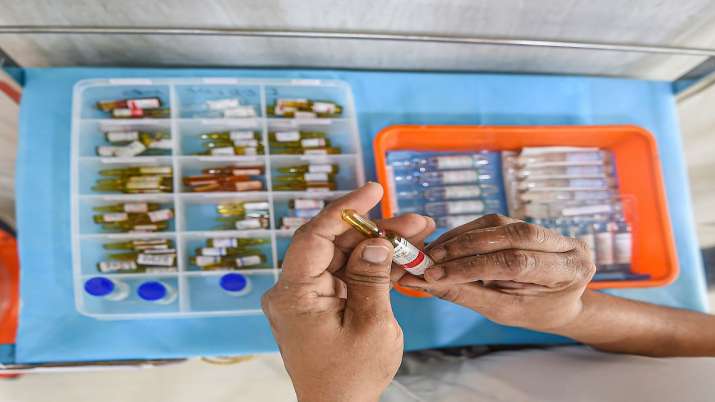
Ramaphosa said that vaccination is also necessary for the economic recovery of the country.
South Africa’s fourth COVID-19 wave was anticipated and the emergence of the new Omicron variant was inevitable, with President Cyril Ramaphosa calling the rise in infections a matter of “great concern”.
The president said the number of daily infections has increased five-fold over the past week, with nearly a quarter of all COVID-19 tests now returning positive.
Two weeks ago, only two percent tested positive.
“While the increase in infections is a matter of great concern, we must remember that we anticipated it. Disease models in our country have told us that we will experience a fourth wave around this time and it was almost inevitable that new forms of the virus would emerge,” Ramaphosa said in his weekly newsletter for the nation on Monday.
“As the country enters the fourth wave of COVID-19 infections, we are experiencing a rate of infection that we have not seen since the pandemic began.
The Omicron variant, brought to global attention by South African scientists about two weeks ago, appears to be dominating new infections in most provinces,” he said.
He said scientists in South Africa and around the world are still working hard to answer important questions about the new Omicron variant, such as its transmission potential, its progression, whether it causes more severe disease and How many effective vaccines will there be against it? Ramaphosa urged people to get vaccinated and take measures to ensure collective safety without waiting for strict lockdown rules.
“As we enter the fourth wave, and as the country prepares for the festive season, the immediate priority is to get as many people vaccinated. Scientific evidence shows that vaccination is the most effective means of preventing the spread of new infections, and that vaccines reduce serious illness, hospitalization and death,” he said.
“As the days go by, and as infections progress, the reasons for vaccination become more compelling and the need becomes more urgent. Vaccines are safe, and like all other routine vaccinations that we got as children and against diseases like measles, they provide the most potent form of protection available,” he said.
Ramaphosa said vaccination was also necessary for the country’s economic recovery, because as more people are vaccinated, more areas of economic activity will open up.
“We can do our jobs and socialize under less stringent restrictions, and our lives can return to some degree of normalcy. As individuals, we must carefully consider the implications of the risk of becoming uninfected and the risk of spreading infection to our children, parents, relatives, coworkers and those we don’t even know,” Ramaphosa said.
South Africa is currently at the bottom of its five-stage lockdown strategy, but there is speculation it could be extended this week as infections rise rapidly. Ramaphosa confirmed that a meeting of the National Coronavirus Command Council would be convened “soon” to review the pandemic situation.
“This will enable us to take even more necessary measures to keep people safe and healthy,” he said. With people frustrated by the last-minute cancellations of major public events, Ramaphosa said evidence showed that large public gatherings, especially those held indoors, carry the greatest risk of transmission.
“We shouldn’t have to wait for new rules before we can reduce the size of gatherings, because research has shown it to be an effective means of reducing the spread of the virus,” the president said. Ramaphosa said hospitals are preparing to admit more patients, even though the effect the Omicron version will have on this is not yet known.
“In the coming days and weeks, we will learn more about the Omicron variant. Also, we are keeping a close watch on infection and hospitalization rates,” he said. On Monday evening, the National Institute of Communicable Diseases reported that there were 86,728 active COVID-19 cases across South Africa.
Read also | Omicron Edition Live Updates: With Omicron, third wave expected to hit India by February
Read also | Omicron Scare: Lockdown in Delhi? What has Health Minister Satyendar Jain to say
,